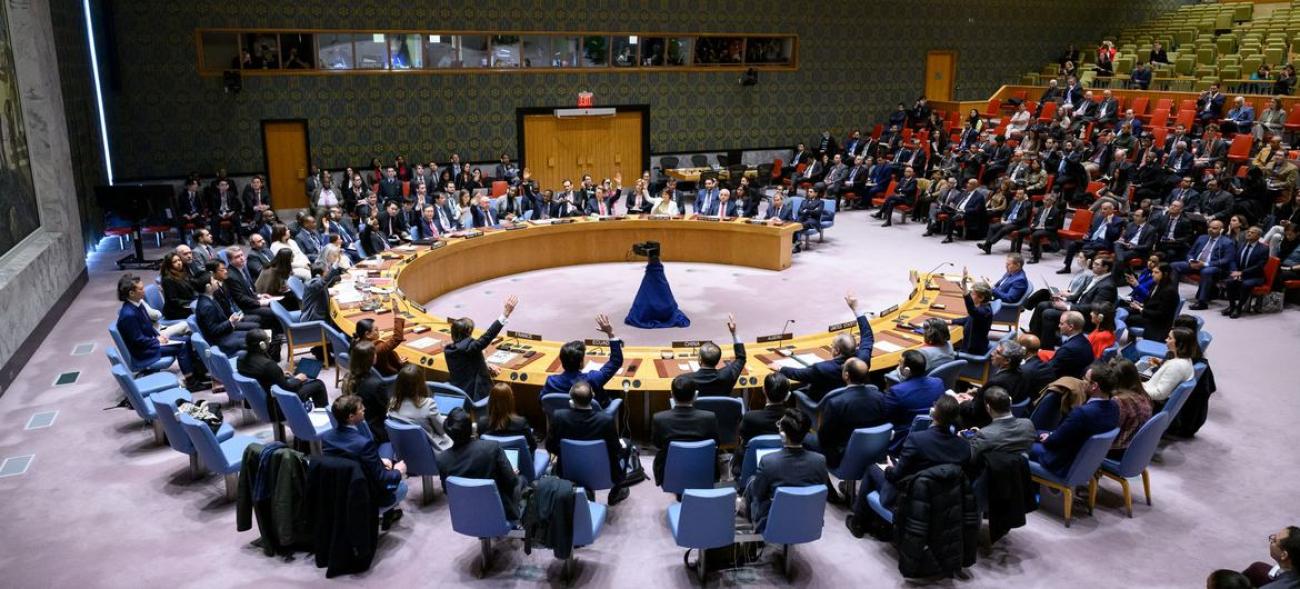UN Security Council demands ‘immediate ceasefire’ in Gaza, ending months-long deadlock

The UN Security Council adopted a resolution demanding an immediate ceasefire in war-ravaged Gaza and calling for the release of all hostages.
This was the Council’s first explicit call for an immediate ceasefire since Israel began a military offensive in the Gaza Strip following last October’s brutal attack by Hamas and other Palestinian groups against settlements in southern Israel, in which over 1,200 people were killed and more than 250 taken hostage.
Israel’s military operation has since reportedly claimed over 32,000 Palestinian lives, mostly women and children, displaced about 1.7 million and left massive destruction across the enclave.
The 15-member Security Council has failed in its four previous attempts to adopt a resolution on the Gaza crisis, most recently this past Friday, when permanent members China and Russia vetoed a proposal led by the Unted States (another permanent member, along with France and the UK rounding out the so-called ‘P-5’).
The US, which vetoed three earlier Council texts, abstained today, allowing the measure to pass. Washington’s change in position reportedly came after intense weekend negotiations among Council members.
Find out more about what happens when the Security Council is deadlocked
The Council’s action comes as Secretary-General António Guterres, on his annual solidarity trip, is visiting the region, where on Saturday, he spoke to reporters from the Rafah border crossing between Egypt and Gaza, calling the conditions in the enclave “a moral outrage” and urging an immediate humanitarian ceasefire so Gaza could be “flooded” with desperately needed aid.
Reacting immediately after Monday’s vote, the UN chief said on X that the long-awaited resolution must be implemented.
The Council’s failure to do so “would be unforgivable”, he stated.
Security Council’s demands
Resolution 2728 (2024), adopted with 14 votes in favour and one abstention (United States), “demands” an immediate ceasefire for the remainder of Ramadan, respected by all parties and “leading to a lasting sustainable ceasefire”.
It also demands the immediate and unconditional release of all hostages and calls for ensuring humanitarian access to address their medical and other humanitarian needs.
The Council further demands that the parties comply with their obligations under international law in relation to all persons they detain.
Protection of civilians
The Security Council also acknowledged the ongoing diplomatic efforts by Egypt, Qatar and the United States, aimed at reaching a cessation of hostilities, releasing the hostages and increasing the provision and distribution of humanitarian aid.
In addition, it reiterated its demand that all parties comply with their obligations under international law, and deplored all attacks against civilians and civilian objects, violence and hostilities against civilians and acts of terrorism.
It further recalled that the taking of hostages is prohibited under international law.
By the resolution's provisions, the Council emphasized the “urgent need to expand the flow of humanitarian assistance to and reinforce the protection of civilians in the entire Gaza Strip" and reiterated "its demand for the lifting of all barriers to the provision of humanitarian assistance at scale”.
Pen holders
Prior to the adoption, elected Council member Mozambique introduced the draft text on behalf of the group of 10 elected members, known as the "E-10".
Pero Afonso, Ambassador and Permanent Representative of the country to the UN, said it was essential to end the catastrophic situation in the Gaza Strip, which is a matter of “grave concern to the entire international community” and a clear threat to peace and security.
He said the E-10 group have always supported the call for an immediate ceasefire as a “fundamental” starting point, but the draft resolution also demands the immediate release of all hostages and full humanitarian access to them.
“Given the utmost urgency of the situation, we call on all members to vote in favour of the resolution and work towards a comprehensive ceasefire and a lasting peace in the Middle East," he said.
Alongside Mozambique, the elected members of the Security Council are Algeria, Ecuador, Guyana, Japan, Malta, Republic of Korea, Sierra Leone, Slovenia and Switzerland.

